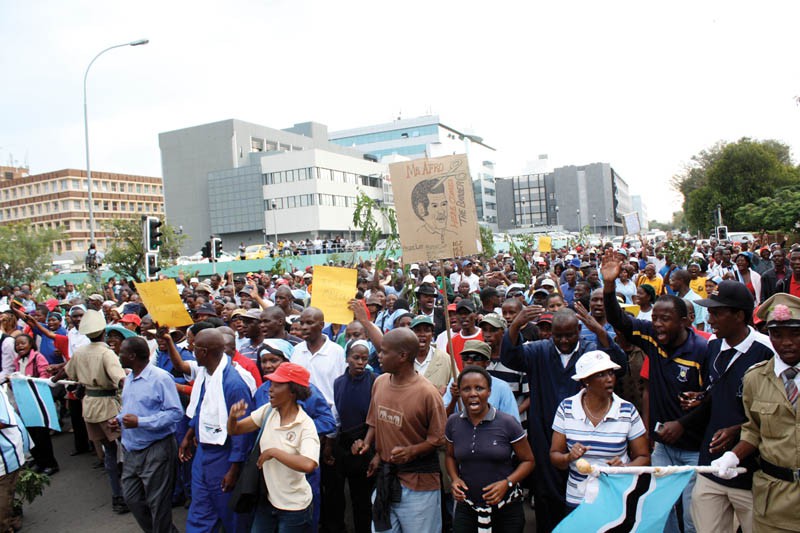Gulf emerges as crunch wage talks begin
Tsaone Basimanebotlhe | Tuesday March 10, 2015 18:00


Unionists are reportedly pushing for a 15 percent hike, while government is offering four.
Yesterday evening, representatives from the public sector unions and the Department of Public Service Management, were scheduled to meet to set dates for the next round of talks.
The parties met previously where preliminary presentations were made, mainly dwelling on the economic outlook both domestically and internationally.
It is understood the negotiation will be difficult because government’s offer was hammered out internally according to budget forecasts.
“Negotiations have started in earnest. The Botswana Federation of Public Sector Unions had already submitted its proposal last year and government countered two weeks ago, with their offer of four percent,” said an insider.
Finance Minister Kenneth Matambo recently revealed that an offer had been made to the unions, adding that it was based on financial projections. “Such an offer is based on projected financial resources and it is expected that the trade unions will appreciate the budgetary constraints facing the government,” Matambo said during his budget speech.
Further indications of the size of government’s offer came last week, when Bank of Botswana governor, Linah Mohohlo said any increase in public service wages was expected to be modest.
“As indicated in the 2015 budget speech, any increase in salaries for public servants is likely to be modest and, therefore, not generate significant demand and expectations-related inflationary pressures,” she said during the Monetary Policy Statement launch.
Yesterday, an analyst said the current record low inflation and even lower forecasts would work against workers in the negotiations.
“Inflation is currently at a four-decade low and the Bank of Botswana has said it expects it to go even lower, below three percent, later this year.
“Government will be able to argue for a small adjustment based on the projections for inflation,” the analyst said.
Mmegi has also learnt that the introduction of overtime allowance for all non-commuted civil servants is included in the ongoing wage negotiations. Non-commuted employees are those whose nature of work does not always require them to work outside normal-working hours as happens with soldiers, wildlife wardens and the police.
However, a leaked Cabinet memo, suggests that government has already taken a decision on the quantum of overtime allowances for the 2015/16 financial year.
The memo indicates that from April 1, 2015 civil servants on C3 grade and above, including permanent secretaries, shall receive five percent of their basic salary, while those on C4 and below shall receive 10 percent of their basic salary as overtime allowance. The planned allowances are lower than the current ones and come as government battles to rein in the costs of overtime and its management within the civil service. The details are found in Cabinet memo 153 reference SE/19/5 LIX (24). President Ian Khama has approved the introduction of the allowance.
The introduction of the allowance will see officers who have been relying heavily on overtime claims receiving less than a quarter of what they used to claim, in some cases.
“For example a C3 employee, earning P7,000 will get P350 overtime allowance in contrast with say, P3,000 that they may have normally claimed,” the memo reads.
The introduction of the allowance means a civil servant will now be expected to work as many hours as their supervisor or the work demands – up to a maximum of 14 hours a week without receiving further compensation.
According to the memo, a civil servant will have a choice to sign ‘An Undertaking Form’. “…those who do not sign the Undertaking Form and are authorised to work overtime, should be paid overtime not exceeding 5 or 10 percent of the basic salary,” the memo reads.
Early August, the then director of Public Service Management, Carter Morupisi, said that civil servants were abusing overtime, and threatened government would take action against those in the habit.
There is already a government-wide investigation against those believed to have abused overtime, and some have been called for disciplinary hearings. “In the year 2013-2014 alone, non-commuted overtime payment amounted to a staggering sum of P516.4 which represents about 56 percent of the overall overtime bill in the public service,” he said at the time. Morupisi added that the huge bill was due to lack of supervision.
Under the new overtime allowance system, civil servants can work up to 56 hours per month (14 hours a week) without receiving any reward beyond the allowance.
“As an interim measure the permanent secretary to the president should issue an administrative directive to all supervisors capping overtime payments as the law provides, at not more than 14 hours a week,” adds the memo.
